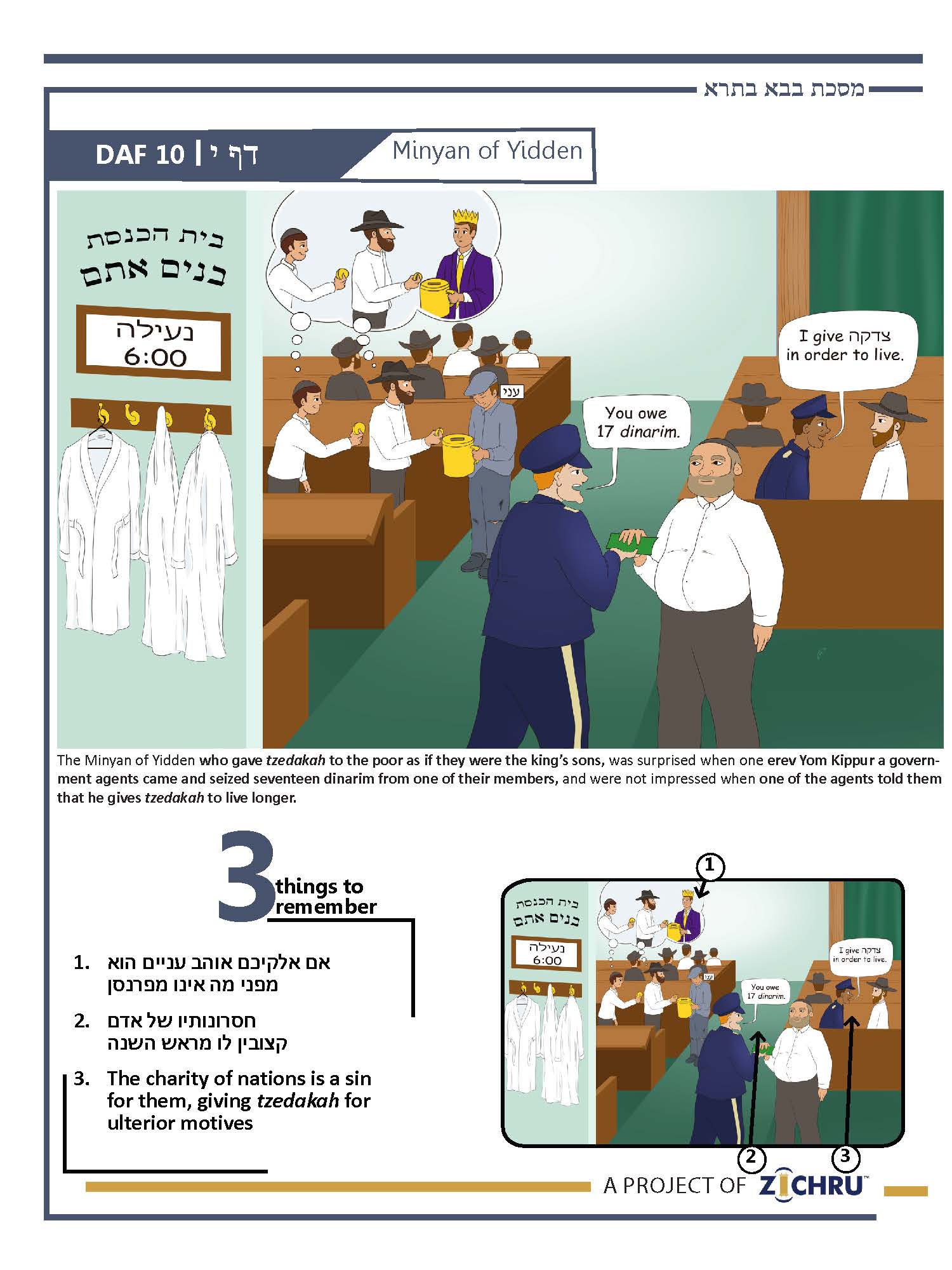Bava Basra - Daf 10
- Audio Timestamps
0:00 - The 3 Sugyos
2:59 - Review of 3 Sugyos
5:42- Siman
7:53 - 4 Blatt Back Chazarah
15:47 - Pop Quiz (Last 7 blatt)
- For access to all Zichru resources including PDFs, and illustrations CLICK HERE
- אם אלקיכם אוהב עניים הוא מפני מה אינו מפרנסן
Rebbe Meir would say that a wicked person could make an argument: אם אלקיכם אוהב עניים הוא – If your G-d loves the poor, מפני מה אינו מפרנסן – why does He not provide for them? Rebbe Meir says one should respond: כדי שניצול אנו בהן מדינה של גיהנם – so that we should be saved from the punishment of Gehinnom through giving them tzedakah. Turnusrufus asked Rebbe Akiva this question, and Rebbe Akiva gave the same answer. But Turnusrufus objected that on the contrary, giving tzedakah should condemn you to גיהנם! For it is like a king who became angry at his servant and imprisoned him, and ordered that he should not be fed; if someone feeds him, will the king not be angry at him? And Jews are called "עבדים" of Hashem! Rebbe Akiva responded that it is like a king who imprisoned his son, and someone fed him despite the king’s orders, כששמע המלך לא דורון משגר לו – when the king hears about it, does he not send him a present? And Jews are called "בנים" of Hashem. Turnusrufus argued that now, when they are not doing Hashem’s will, they are only called servants, but Rebbe Akiva countered that a passuk teaches to give tzedakah at all times.
- חסרונותיו של אדם קצובין לו מראש השנה
Rebbe Yehudah the son of Rebbe Shalom darshened: כשם שמזונותיו של אדם קצובין לו מראש השנה – Just as a person’s sustenance for the year is fixed for him on Rosh Hashanah, כך חסרונותיו של אדם קצובין לו מראש השנה – so too a person’s losses for the year are fixed for him on Rosh Hashanah. זכה "הלא פרוס לרעב לחמך" – If he merits, he will give that amount to the poor, fulfilling “you will break your bread for the hungry;” לא זכה "ועניים מרודים תביא בית" – if he does not merit, the loss will be through government confiscation, as it says, “and the wailing poor you will bring to your house.” This is illustrated with a story in which Rebbe Yochanan ben Zakkai saw in a dream that his nephews would lose seven hundred dinarim that year. During the year, he convinced them to give almost the entire sum, leaving only seventeen dinarim. On Erev Yom Kippur, the government seized seventeen dinarim from them. Rebbe Yochanan ben Zakkai informed them of his dream, and that that no more would be taken. They asked why he did not tell them sooner, so they could give the full amount to tzedakah, and he explained that he wanted them to perform the mitzvah לשמה.
- The charity of nations is a sin for them, giving tzedakah for ulterior motives
Rebbe Yochanan ben Zakkai asked his talmidim the meaning of the passuk: צדקה תרומם גוי וחסד לאומים חטאת – charity exalts a nation, and the kindness of nations is a sin. Rebbe Eliezer said the first (singular) phrase refers to Yisroel, who are called "גוי אחד" – a unique nation, and the second teaches: כל צדקה וחסד שאומות עובדי כוכבים עושין – all the charity and kindness which the idolatrous nations perform, חטא הוא להן – it is a sin for them, שאינם עושין אלא להתגדל בו – because they only perform them to live longer. The Gemara asks that a Baraisa teaches that one who gives tzedakah "בשביל שיחיו בני" – so that my sons should live, or to merit עולם הבא, is a צדיק גמור!? It answers that the Baraisa refers to a Jew, who gives the tzedakah wholeheartedly. Other motives were suggested as the sin of idolatrous nations’ tzedakah: (1) כדי שתמשך מלכותן – so their government should last, (2) להתיהר בו – to be glorified through it, (3) and לחרף אותנו בו – to rebuke and mock us through it.
Siman – Minyan of Yidden
The Minyan of Yidden who gave tzedakah to the poor as if they were the king’s sons, was surprised when one erev Yom Kippur government agents came and seized seventeen dinarim from one of their members and were not impressed when one of the agents told them that he gives tzedakah to live longer.


